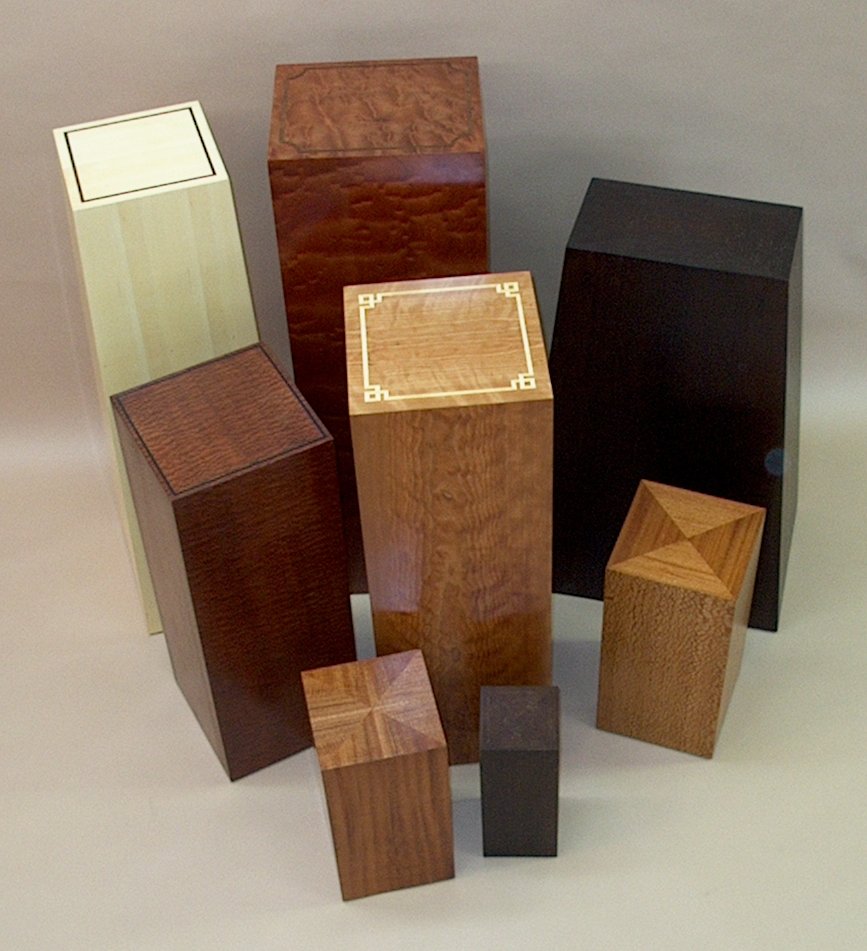Display Stands - Tops
In some instances, inlay work on the sides of a display stand may compete too much with the object being displayed. A tasteful inlaid border on the top however can help frame and set off the object. And for veneer with a distinct straight grain, a diamond match on the top can have the same effect as an inlaid border.
In the following picture are a sample of the possibilities for veneered display stand top treatments. Clockwise from the back left corner are an inlaid maple top, an inlaid quilted makore top, a diamond quartersawn wenge top, a diamond quartersawn mahogany top, a second diamond quartersawn wenge top, a fiddleback mahogany reverse diamond top, an inlaid sapele top, and in the middle an inlaid figured cherry top.

INLAID SLIP MATCHED MAPLE TOP
The three piece inlay consists of inner and outer narrow strips of black dyed marfum and a middle cross grain strip of quartersawn padauk. The square inlay pattern is 3/16" wide and starts 3/4" from the edges of the top.
INLAID QUILTED MAKORE TOP
The inlay is a modified rectangular pattern with quarter circles for the corners. The quartersawn nogal walnut is 1/4" wide and starts 3/4" from the edges of the top.
DIAMOND MATCHED QUARTERSAWN WENGE TOP
Although not easy to see, the top is four triangular pieces meeting in the center, with the grain in each piece parallel to the outer edge of the top. The effect is a "picture frame" of the object being displayed.
DIAMOND MATCHED QUARTERSAWN MAHOGANY TOP
There was only enough button lacewood veneer immediately available to cover the four sides, so quartersawn mahogany was used for the top. Like the wenge top in the previous paragraph, the parallel grain forms a frame for the object displayed.
DIAMOND MATCHED QUARTERSAWN WENGE TOP
Another example of a diamond matched top.
REVERSE DIAMOND FIDDLEBACK MAHOGANY TOP
In a reverse diamond pattern, the grain in each section of the top points towards the object being displayed rather than forming a frame around it.
INLAID BOOK MATCHED POMMELE SAPELE TOP
The square inlay pattern, 3/16" wide black dyed marfum, starts only 5/16" from the edges of the top. Such a narrow outer band of sapele would work with a displayed object that is almost as large as the top itself.
INLAID "ROPEY" FIGURED CHERRY TOP
The maple inlay is 1/4" wide and starts 1" from the edges of the top. The rubbed linseed oil forming the first step in the finishing process adds a slight tint to the maple so that it works even better with the cherry. The figure and grain of the cherry continues smoothly through the four small squares of cherry captured within the maple inlay.
The above are a brief picture of some of the possible combinations of veener and patterns that can be used to help a display stand give prominence to and highlight an object.
Return to Display Cabinets Stands and Tables page